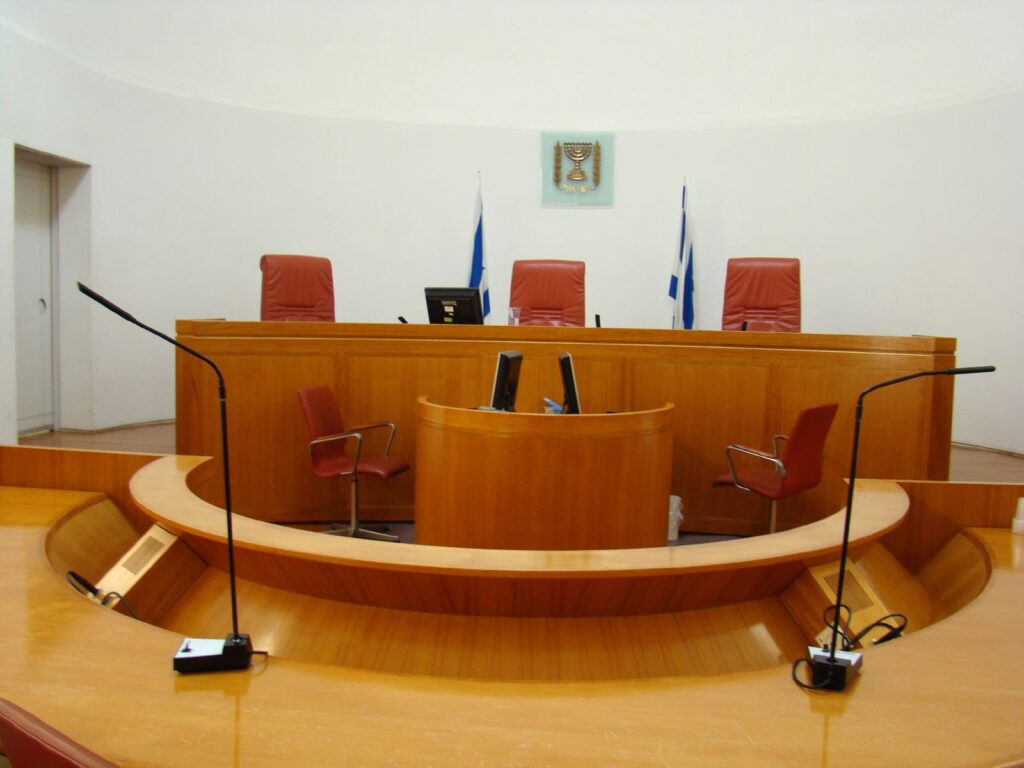How much power should constitutional courts have over laws passed by elected officials? The question has become a flashpoint in Israel, where hundreds of thousands of protesters—many from the political left—have taken to the streets in opposition to the ruling government’s attempt to reform the judiciary. The protesters’ core message is that the Israeli Supreme Court is an important check on the ruling coalition and a protector of minority rights. A major focus has been on the power of the courts to overturn legislation. If the courts can’t overturn legislation, the argument goes, Israel cannot be a real democracy.
These arguments sit uncomfortably alongside arguments from liberals and the left in the United States. As the U.S. Supreme Court continues its hard rightward shift, many progressives have argued for reforming or disempowering the Court, and they too have invoked democracy. In critiquing the Court’s power, Samuel Moyn, for one, has emphasized that “in democracies, it is the people who are supposed to write their own laws.” If the courts can overturn duly enacted national legislation, the argument goes, then the United States cannot be a real democracy.
What’s going on? How can the left in one country condemn the courts while the left in the other embraces them, both claiming the mantle of democratic values? The cynic might say that everyone is an opportunist: the left and right alike, in all countries, defend institutions controlled by their allies and condemn those controlled by their ideological opponents. There is of course some truth to this explanation, but there is also a deeper story.
Two key differences distinguish judicial review in Israel and the United States, and these differences make it reasonable for the left to embrace the courts in the former case while condemning them in the latter. First, the Israeli lawmaking system has many fewer veto points than the American one. And second, the Israeli Knesset is less likely to protect the rights of minorities than the U.S. Congress. When it comes to the role of judicial review in a democratic system, these features matter a great deal.
Begin with veto points. Every democracy requires bills to run a procedural gauntlet before becoming law. A proposal must typically survive scrutiny by legislative committees, withstand attempts to amend it or water it down, be passed by one or two legislative chambers (on either a majority or supermajority basis), and, in many cases, receive the assent of a chief executive. The details of these hurdles vary considerably by system, of course, but in any democracy the story of lawmaking is a story of overcoming a series of veto points, any one of which could stop a bill in its tracks.
Seen this way, judicial review—itself a kind of veto point—can only be evaluated in the context of the political system as a whole. If a lawmaking system has many veto points, it is less important that courts serve as a check on lawmaking, since there are other impediments to government enacting harmful laws. If a system has fewer veto points, by contrast, judicial review becomes relatively more important.
The United States and Israel sit at opposite ends of this spectrum, at least with respect to lawmaking at the national level. In the United States, federal legislation needs to pass the House, pass the Senate (with a supermajority of at least sixty votes on most issues), and gain the President’s approval. The president and the two chambers of Congress are elected separately, and often legislation favored by one branch or chamber is thwarted by another. The noted political scientists Alfred Stepan and Juan Linz have observed that, compared to other longstanding democracies, “the United States is politically exceptional in the high number of electorally based veto players who potentially can block social change.”
For this reason, legislating in the United States is extremely difficult. Congress can enact major legislation on topics of bipartisan cooperation, like the infrastructure and industrial policy bills enacted over the last two years, but those topics are few and far between in our polarized age. During periods of unified partisan control, Congress can also enact party-lines legislation if that legislation is a taxing-or-spending measure exempt from the filibuster: think of the Trump administration’s tax cuts or the Biden administration’s American Rescue Plan and Inflation Reduction Act. But on many topics, Congress simply cannot act, even in the face of widespread public pressure. The failure of multiple attempts to pass the DREAM Act—despite overwhelming public support for the legislation and majority support in both the House and Senate—is a case in point. Even when it comes to raising the debt ceiling, few are under any illusion that a legislative solution will come easily. For these reasons, public commentary on Congress focuses overwhelmingly on the chamber’s frequent inability to act—and rightfully so.
Things are very different in Israel. Israel’s Knesset is a unicameral legislature, with one chamber rather than two. It has no filibuster or other formal supermajority requirements. As a parliamentary system, the executive and legislative power is concentrated in a single governing coalition. The veto points that characterize lawmaking in the United States are strikingly absent in Israel, where laws can and do frequently pass with razor-thin majorities.
Even relative to other parliamentary systems, Israeli democracy has few checks on lawmaking power by the ruling coalition. Some national parliaments, including the United Kingdom’s House of Commons, elect members from single-member districts that look much like House districts in the United States. Others—Germany’s Bundestag, Mexico’s Chamber of Deputies, New Zealand’s House of Representatives—combine elements of proportional representation with first-past-the-post districts. These various systems come with a host of advantages and disadvantages, but one common feature is that at least some members of the national legislature have at least some independent electoral base, distinct from that of their party. Even though party discipline is often quite strong in practice, it is at least possible for legislators with independent electoral bases to defect from party orthodoxy.
Not so for members of Israel’s Knesset. Knesset members are elected from a single nationwide electoral district. The Israeli system is a “closed list” system in which citizens do not vote for individual legislators; they only have the opportunity to vote for their party of choice. The party is then allocated a given number of seats, which are occupied by those at the top of the party’s list. Internal primaries to constitute the list, where voters could voice support for or displeasure with individual legislators, have increasingly given way to party lists handpicked by the party leader, and consequently reflecting loyalty to that leader.
This power of party leaders to discipline their members also erodes the possibility of veto points within the legislature by making it riskier for Knesset members to dissent. Those members know that, were they to defect from the party line, they would jeopardize their positions in the Knesset. In the United States, by contrast, even when a party enjoys unified control of government, individual legislators have their own constituencies of voters, donors, and interest groups that can encourage legislators to scuttle their party’s goals. Think of Joe Manchin reining in the Biden administration’s legislative agenda, John McCain preventing the Trump administration from repealing Obamacare, and the recurrent tensions between the Freedom Caucus and Republican House leadership over the past decade. The bar to defecting in Israel is much higher, and recent defections have largely been driven by the machinations of party leaders themselves—usually by Benjamin Netanyahu.
While our focus is on judicial review of legislation, other aspects of the Netanyahu government’s reform proposal would also reduce the friction that the ruling coalition faces in attempting to make policy. The reform package includes calls to give the government greater control over how justices are appointed and to make legal counsels within government ministries less independent. In a governmental system that already has precious few voices capable of dissenting from the ruling coalition, these would be steps toward even greater homogeneity within the government.
In short, eliminating judicial review in Israel risks removing a veto point from a system that is already quite short on them. The United States faces the opposite risk: that overly empowered courts further bog down a frustratingly veto-heavy legislative docket. In this respect, the two countries are something like mirror images. Veto points are not democratic (or undemocratic) in and of themselves; whether the political system has too many or too few veto points can only be decided in the context of the entire system’s political effects.
This brings us to the second feature that distinguishes the significance of judicial review in the United States and Israel: the protection of minority rights. There are many possible reasons to empower unelected courts, but one common answer in constitutional theory is that courts are necessary to protect the rights of minorities. In a system of majoritarian democracy, the reasoning goes, minority groups need a countermajoritarian institution—and courts can be that institution.
Here, too, the United States and Israel look very different. At least when it comes to national legislation, for over a half century the U.S. Congress has done surprisingly well protecting minority rights. Since the 1960s Congress has passed many major statutes to protect a range of demographic minorities. Discrimination on the basis of race, sex, national origin, religion, and disability are illegal in many areas of American life. When Congress harms the interests of minorities, it does so more often through sins of omission—say, by insufficiently funding a welfare state—than through sins of commission.
However appealing the minority-rights justification for giving the U.S. Supreme Court the power to strike down national legislation is in theory, it is thinner in practice. Courts, at least in the United States, are designed to correct sins of commission rather than omission. And there are very few examples of Congress oppressing minorities and courts striking down that oppressive legislation. Cases like United States v. Windsor (2013), which struck down the Defense of Marriage Act, are the rare exception. To the contrary, the Supreme Court more often harms the interests of minorities, as when it strikes down voting rights legislation in cases like Shelby County v. Holder (2013) or, as many expect this summer, interprets the Constitution and federal civil rights law to ban affirmative action. (The story is different when it comes to the Supreme Court protecting minorities from state government overreach, but for the sake of an apples-to-apples comparison we focus on the national level.)
One reason that the U.S. Congress has been fairly successful at extending minority rights is that various minorities in the United States exercise considerable political power, thanks to the demographics of legislative districts and the internal dynamics of the two parties. The same can’t be said of minority groups in Israel. Non-Jewish citizens of Israel hold limited political power, and non-Jewish residents of the West Bank have no voice in Israeli democracy at all.
The reason lies in the very different political systems in the two countries. Once the United States reached something like the universal franchise in the mid-twentieth century, minorities became important voting blocs whose interests needed to be taken into account by parties hoping to gain a legislative majority. The United States came to have a considerable number of “majority minority” congressional districts, and even more districts in which minorities are key voting blocs. Perhaps most important, the centrality of various demographic minorities to the Democratic Party’s coalition means that advancing those minorities’ interests is a high priority for one of the two major parties.
Electoral dynamics in Israel are much less favorable to disadvantaged minorities. The fragmented nature of Israeli society has allowed some right-wing Jewish parties to become coalitional “kingmakers” that ensure a majority for a governing coalition in return for major concessions to their interests—interests that often clash with those of the public at large. In the current government, for example, Netanyahu could only garner a majority coalition by partnering with Itamar Ben-Gvir’s Jewish Power party and Bezalel Smotrich’s Religious Zionist Party. Those parties, which Netanyahu has no choice but to accommodate if his government is to survive, hold a set of policy views—especially about the role of religion and ethnicity in public life—flatly incompatible with the interests of Israel’s non-Jewish minority.
It would be one thing if other minorities could similarly play kingmaker in ways that advance their interests. But this typically isn’t possible in Israel. Non-citizens, most notably the Palestinian residents of the West Bank, hold no electoral power for the simple reason that they cannot vote in Israeli elections. Arab citizens of Israel can vote, and their parties often gain seats in the Knesset, but those parties have generally been systematically excluded from governing coalitions (with the notable exception of 2021 and the partial exception of 1992).
Given this de facto exclusion of a sizable minority population from legislative power, the courts can serve as a much needed, if limited, corrective. And Israel’s High Court has repeatedly protected the rights of minorities in Israel. It is only thanks to the repeated intervention of the High Court, for instance, that political parties representing the Arab minority have not been disqualified from running in elections at all. A series of court cases, including the landmark Kaadan decision in 2000, laid the groundwork for a liberal understanding of Israeli law, where non-Jewish citizens would be entitled to protection from discrimination in areas like housing, at least nominally. And the High Court has repeatedly annulled legislation that tramples the rights of the most vulnerable members of Israeli society: it has voided legislation that sought to limit the rights of asylum seekers, retroactively legalize construction of illegal settlements in the West Bank on private Palestinian land, and grant the government immunity from compensation claims from Palestinians injured by security forces. These decisions, and others, are undoubtedly victories for vulnerable groups.
There are of course limits to judicial intervention’s ability to create de facto protection for minorities. And the court provides a veneer of judicial legitimacy to the ongoing occupation of the West Bank that in turn justifies settlement expansion by Jewish settlers and expulsions of civilian Palestinian communities. But the intent of the court, at least, has often been to advance minority rights, and in at least some instances that has been the effect of the court’s decisions as well.
All this is to say that where left-wing criticism of (or support for) judicial review is concerned, the status of minority groups is critical. Judicial review is especially important in a political system with a propensity for oppressing minorities, and when the courts have a recent history of being more minority-protective than the legislature. This description, of course, fits contemporary Israel to a tee—even as it is very much not the experience of American progressives in the half century since the end of the Warren Court.
It also matters what sort of minority we’re talking about. Public debates about minority rights typically focus on racial, ethnic, religious, or other demographic minorities. But courts are often called on to protect the rights of an economic minority, property-owners or the wealthy, against the claims of the majority of working people. Both the American and Israeli courts have, at various times, curtailed the right to strike, undermined the welfare state, or struck down regulation that would have served the public interest but imposed costs on business. This makes it all the more tempting for the left to dismiss judicial review out of hand. But as the case of Israel shows, there are contexts in which preserving the political voice of the most disenfranchised members of society will mean preserving an additional veto point in the face of the majority.
Context matters. Judicial review will sometimes be a critical check on rash government action and safeguard of the interests of marginalized demographic minorities. But it will sometimes prevent legislation that would advance the public interest and set back efforts of the elected branches to protect minorities that have successfully gained a measure of political power. The difference will turn on government structures, social context, and political culture.
In our view, those features lead judicial review to play a far more important role in Israel today than it does in the United States. That fact is not a law of nature. In evaluating the importance of judicial review in any country, we shouldn’t succumb to sloganeering about the goodness or badness of courts as a general matter. Rather, we need to look carefully to what role courts play in a particular context, recognizing that judicial review is more important in some polities than in others.
We’re interested in what you think. Submit a letter to the editors at letters@bostonreview.net. Boston Review is nonprofit, paywall-free, and reader-funded. To support work like this, please donate here.







